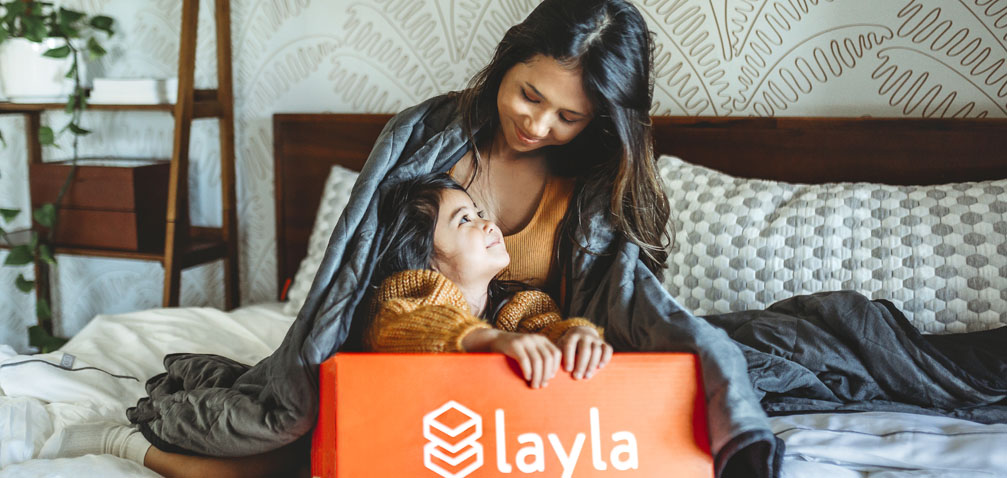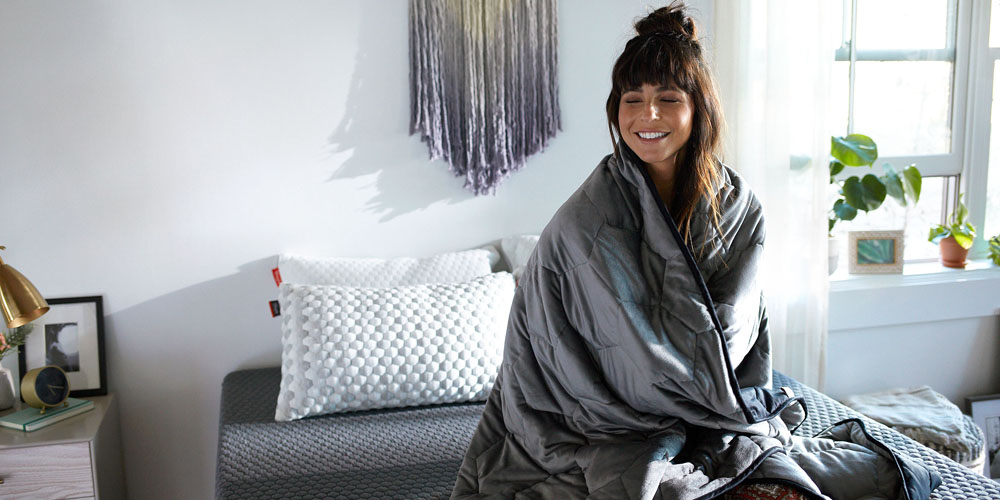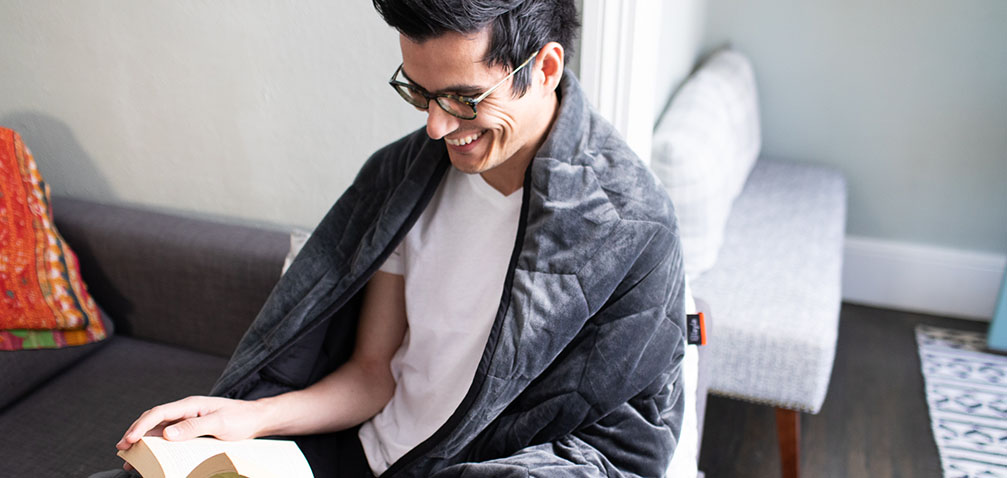When choosing a weighted blanket for kids, you should make a few considerations. This article will discuss weighted blankets for kids and how you can find the best one for your child’s needs.
- What Is a Weighted Blanket?
- How Do Weighted Blankets Work?
- Benefits of Weighted Blankets for Kids
- Risks of Weighted Blankets for Kids
- How to Find the Best Weighted Blanket for Kids
- How Heavy Should a Weighted Blanket for Kids Be?
- Are Weighted Blankets for Kids Safe?
- The Layla Weighted Blanket
- Final Notes: Weighted Blankets for Kids
What Is a Weighted Blanket?
The name of weighted blankets is pretty self-explanatory; essentially, a weighted blanket is a blanket that’s heavier than your regular comforter or throw blanket. Weighted blankets should be about 10 percent of the user’s weight, but you can typically get them at a higher or lower weight as long as you can easily move the blanket off your body.

The materials used in weighted blankets will impact how comfortable it is for your child. Some weighted blankets are made of chunky, heavy knit, but most weighted blankets are made from a soft material like quilted mink, cotton, or fleece. These weighted blankets have filling that can be made of glass, steel, or plastic beads, rocks and stones, or even sand.
The type of weighted blanket you choose will depend on your child’s preferences. You can opt for a fleece weighted blanket or mink weighted blanket in the colder months, and a breathable cotton weighted blanket in the summer.
How Do Weighted Blankets Work?
Weighted blankets are designed to simulate deep touch pressure therapy, also known as deep pressure therapy (DPT). DPT uses weight to apply gentle pressure to the body, which releases feel-good hormones like oxytocin and serotonin. Both of these hormones induce happiness and relaxation. Some people naturally have lower serotonin levels, which can cause depression and anxiety. By boosting serotonin in your body, you can essentially help yourself feel better and fall asleep easier. The same is true for children.
Benefits of Weighted Blankets for Kids
Because weighted blankets simulate DPT, they can be beneficial for kids who struggle with falling asleep, staying calm, or any kid who wants something comfortable to take a nap with. Here are some of the possible benefits of weighted blankets for kids.
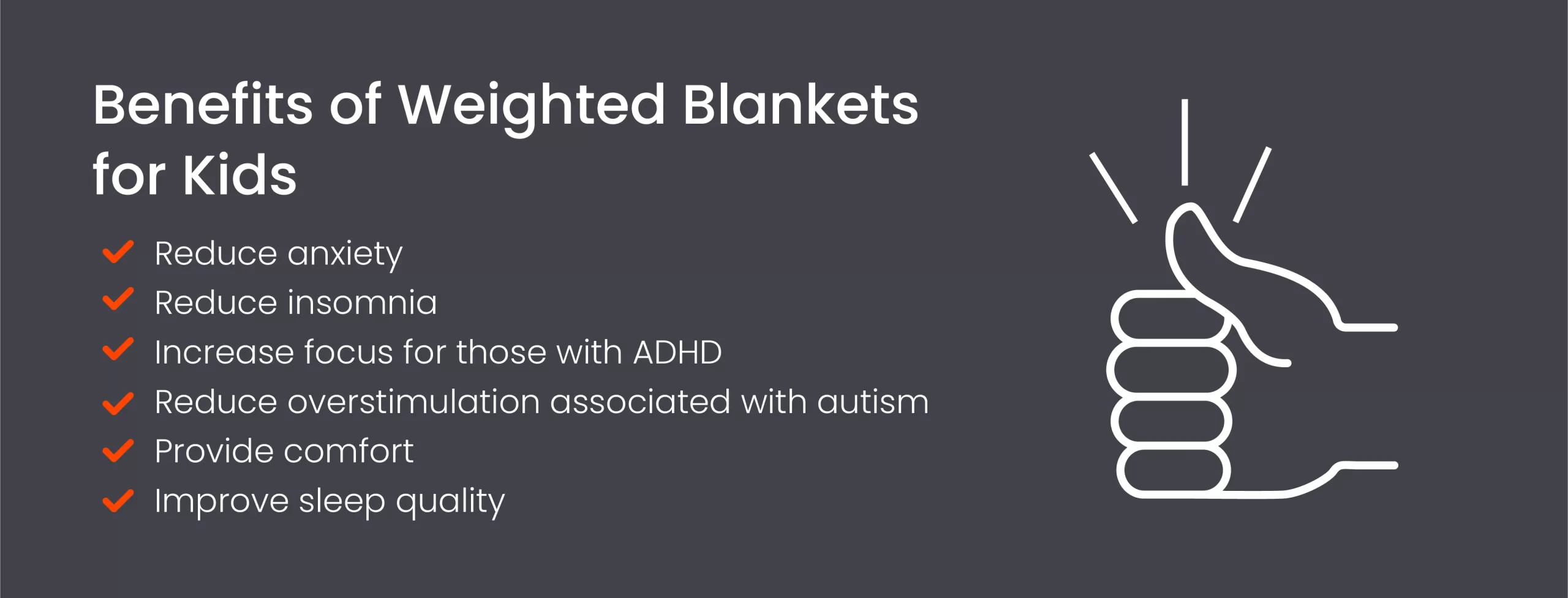
Reduce Anxiety
Weighted blankets may boost a kid’s natural feel-good hormones to help them combat anxiety. Everyone goes through anxiety at some point in their lives, including children. Whether they’re going through a big life change, such as starting a new school, or they simply feel uneasy throughout the day, a weighted blanket for kids may be able to help.
According to PennMedicine, your autonomic nervous system, which controls breathing, digestion, and even sweating, prepares your body for stress or rest; ultimately, your autonomic nervous system is responsible for responding to situations, also known as fight or flight response.
By putting gentle pressure on the body, the autonomic nervous system knows it’s time to rest, which can reduce many of the symptoms of anxiety, including an increased heart rate, to promote a sense of calmness.
Reduce Insomnia
Does your child have trouble falling asleep and staying asleep? They’re not alone. Many people have difficulties falling asleep, with some even having chronic sleep disorders such as insomnia. Sleep disorders may start with stress and anxiety. When you’re stressed, you likely can’t quiet your mind or body enough to fall asleep. Additionally, stress can make existing sleep problems even worse. Even if you don’t have a sleep disorder, you can still have problems falling asleep, especially after a stressful event.
The pressure weighted blankets put on your child’s body can help them calm down after a stressful day by relaxing their heart rate and breathing.
Increase Focus for Those With ADHD
Children with ADHD can have a difficult time controlling their minds, especially when they need to focus on something or sit still. If your child has ADHD, they may struggle with falling asleep, learning, or building healthy relationships. Children with ADHD can become distracted by their environment, which can include anything from people talking to something going on outside their window. It’s more difficult for children with ADHD to focus, especially when it comes to doing homework, listening in class, and even sleeping.
Weighted blankets simulate DPT by activating your child’s sense of touch, which can make them more mindful and feel more grounded. Weighted blankets may also help your child focus and be less distracted by their environment and surroundings so they can sit still and even relax and start to rest at night.
Reduce Overstimulation Associated With Autism
Children with autism can have a difficult time interacting socially. They may also become easily stressed or anxious or have difficulty functioning at home or school. Weighted blankets put gentle pressure across their entire body to help relieve stress associated with autism, which can also improve your child’s ability to focus.
Children with autism may also be sensitive to stimulations, such as loud noises, that may be too intense and cause anxiety, which can make sleeping challenging. DPT through a weighted blanket can help comfort your child and prevent them from becoming overstimulated, so they can relax and fall asleep easier.
Provide Comfort
Whether or not your child has anxiety, autism, ADHD, or any other disorder that can disrupt sleep or cause anxiety, a weighted blanket’s true purpose is to provide comfort for the user. Weighted blankets can help anyone, no matter their age, feel comfortable and secure in ways a regular blanket cannot.
Improve Sleep Quality
If your child is restless and can’t ever seem to fall asleep, you might consider investing in a weighted blanket for kids. Weighted blankets can help boost serotonin and melatonin while decreasing cortisol, also known as the stress hormone, to help kids fall asleep faster and stay asleep the entire night. In turn, this can improve their quality of sleep, so they can wake up feeling rested and rejuvenated.
Risks of Weighted Blankets for Kids
While weighted blankets for kids are considered relatively safe, there can be some risks, especially when the weighted blanket is used or cared for incorrectly. It’s important to choose the right weight and size for your child because many children can feel trapped underneath, even if they’re able to lift the blanket. As stated, the general rule of thumb is to use a weighted blanket that’s 10 percent of your body weight. So, if a child is 50 lbs, a 5 lb weighted blanket should suffice.

Additionally, you should always ensure your child can lift the blanket off their bodies on their own so they won’t become claustrophobic and can avoid suffocation. Finally, weighted blankets should never be used to hold your child down in place; they are a tool to help calm your child, not prevent them from moving around.
Weighted blankets might not be the right fit for young children and infants because if they rip, the beads or filling inside the blanket can become choking hazards. Additionally, a weighted blanket is likely to be too heavy for infants who don’t have enough muscle to move the blanket off of their bodies if the blanket covers their face.
Of course, no matter how old your child is, you should ensure they know how to properly use their blanket. It’s always best to watch your child sleep with their weighted blanket before allowing them to use it on their own. You should also inspect your child’s blanket to ensure there are no rips or tears.
How to Find the Best Weighted Blanket for Kids
Finding the best weighted blanket for kids is easy when you know what to look for. When considering which weighted blanket to buy your child, consider the following:
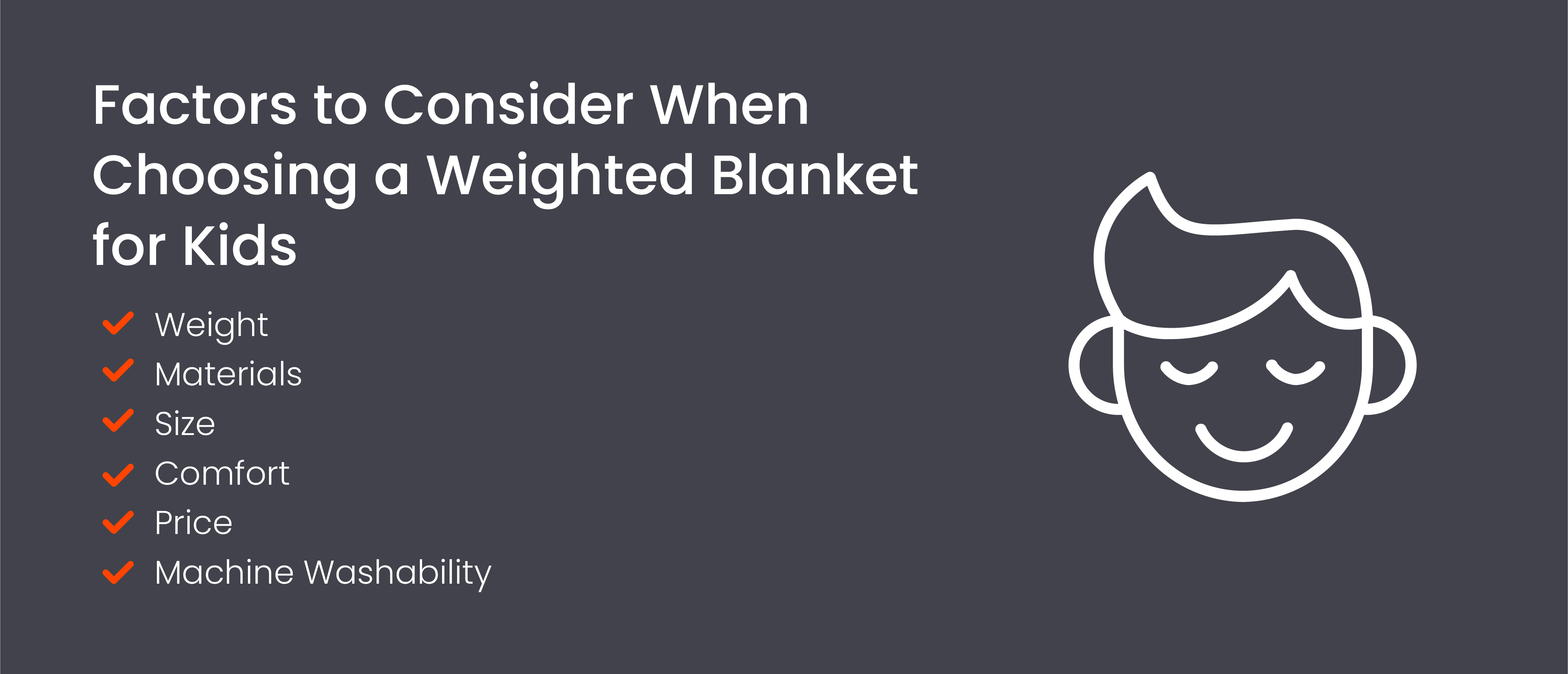
- Weight: How heavy should a weighted blanket be? For anyone, including children and adults, it’s best to choose a weighted blanket that’s about 10 percent of your body weight. Remember, weighted blankets are not suggested for young children. When it comes to finding a weighted blanket for anyone, you might not find exactly 10 percent of your body weight, you can add a few pounds. For example, if your child is 40 lbs, you can get them a weighted blanket that’s 5 lbs.
- Materials: Materials include the fillings and the fabrics used in the weighted blanket. Fillings will depend on your price point and preferences. Each type of filling has pros and cons. Typically, it’s always best to go with glass beads that will evenly distribute the weight across your child’s body. Glass beads are also more durable and don’t contain any unpleasant chemical odors. Of course, you should also consider the actual blanket material, which can be made out of anything from cotton to fleece and everything in between. Some children might not like the feel of fleece and will choose a minky fur weighted blanket instead, but this will be based on their unique preferences.
- Size: What size weighted blanket for kids should you get? The size you choose will depend on your child’s height. You should choose a size that’s not too big or too small for your kid. The blanket should fully cover their body, but it doesn’t need to cover their heads. You should also consider the size of your child’s bed. If the weighted blanket lays over the edge of the mattress, all of the weight will go to that one side, and it will fall off in the middle of the night.
- Comfort: The weighted blanket you choose for your child should be comfortable for them. Some children don’t like the feel of some materials. Additionally, you don’t want to get a blanket that’s too hot, especially during the summer months.
- Price: You can find a weighted blanket at just about any price point, but typically the higher quality the blanket, the more expensive it will be. Of course, there are many great options that are affordable.
- Machine Washability: Knowing how to wash a weighted blanket will be key, especially if the weighted blanket is for a child. As you already know, children can get just about everything dirty, so you’ll want a weighted blanket you can toss in the washing machine without worrying about ruining it.
Learn more about how to choose a weighted blanket in our guide.
How Heavy Should a Weighted Blanket for Kids Be?
A weighted blanket for kids should be roughly 10 percent of their body weight, plus a few pounds added. Of course, you might not find an exact weight for your child, but here is a table to help you determine the best weighted blanket for your kid.
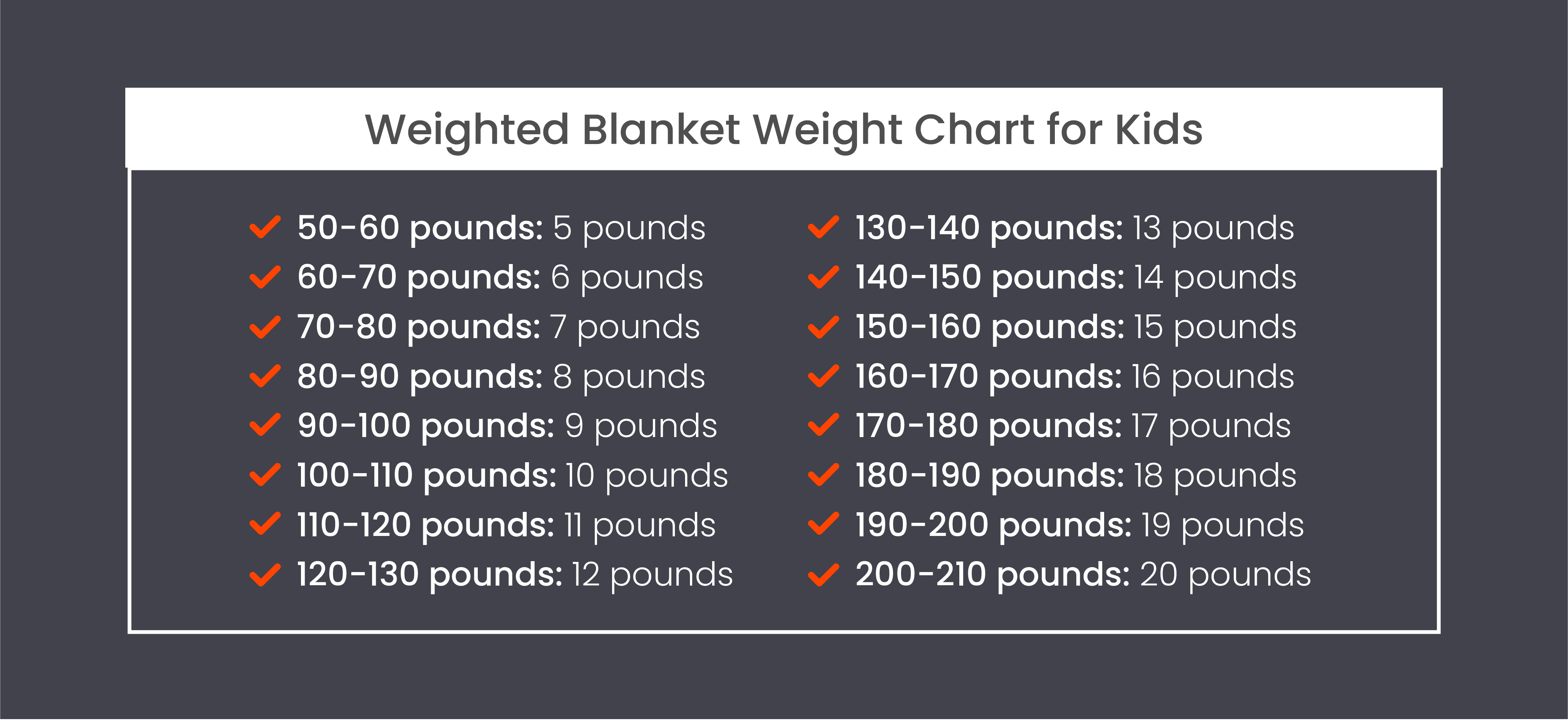
- 50-60 pounds: 5 pounds
- 60-70 pounds: 6 pounds
- 70-80 pounds: 7 pounds
- 80-90 pounds: 8 pounds
- 90-100 pounds: 9 pounds
- 100-110 pounds: 10 pounds
- 110-120 pounds: 11 pounds
- 120-130 pounds: 12 pounds
- 130-140 pounds: 13 pounds
- 140-150 pounds: 14 pounds
- 150-160 pounds: 15 pounds
- 160-170 pounds: 16 pounds
- 170-180 pounds: 17 pounds
- 180-190 pounds: 18 pounds
- 190-200 pounds: 19 pounds
- 200-210 pounds: 20 pounds
Are Weighted Blankets for Kids Safe?
Weighted blankets for kids are considered safe, but it’s important to get the right size and weight to ensure your child can lift the blanket off of their body without any help. Getting a blanket that’s too heavy can put your child at risk of suffocation and claustrophobia. Of course, you should also always ensure proper care of the weighted blanket to ensure it doesn’t rip, as the filling inside can become a choking hazard.
The Layla Weighted Blanket
The Layla Weighted Blanket can improve sleep quality and reduce stress for your child through DPT simulation. Now, your child can feel more relaxed and sleep better to help them get the rest they need for a great day.
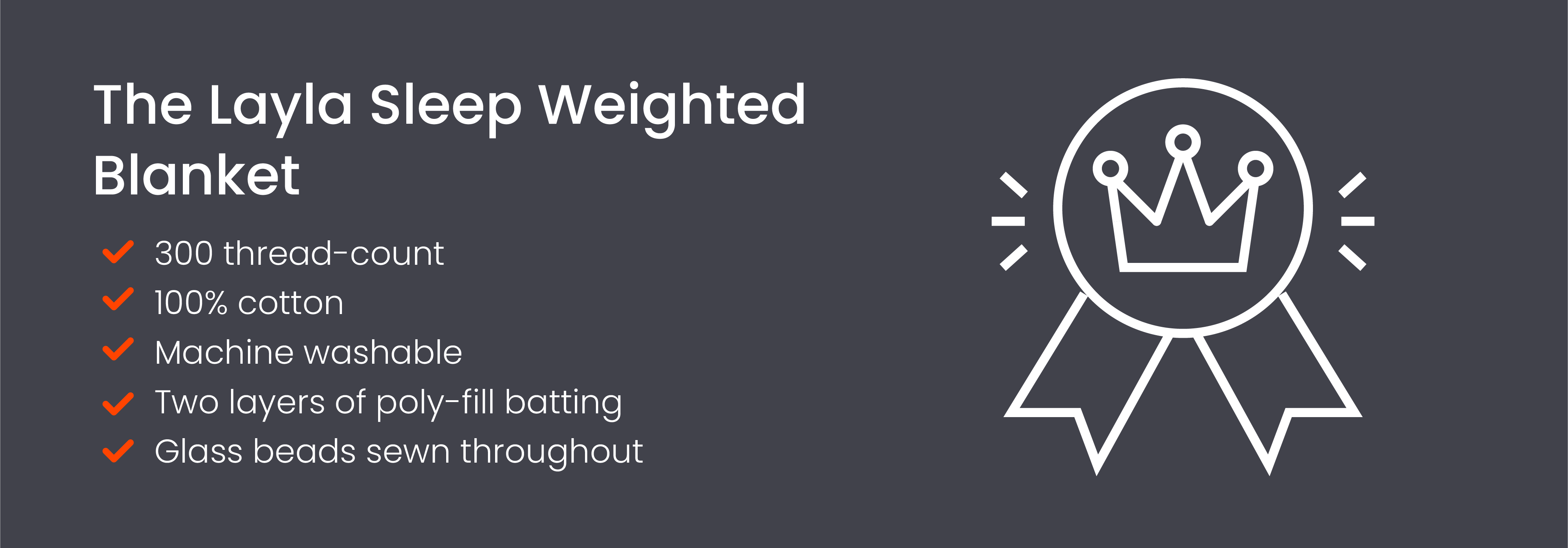
The Layla Weighted Blanket is made from plush, mink-like fur with 300 thread count cotton for a soft and easily washable surface. It’s also filled with glass beads to ensure an even weight distribution across your child’s entire body for better sleep every night.
Final Notes: Weighted Blankets for Kids
Weighted blankets for kids can help your child relax after a long day so they can get better sleep. Whether your child suffers from a disorder that affects sleep or they simply have a difficult time winding down at the end of the day, a weighted blanket can help them feel calmer, happier, and ready for bed.

